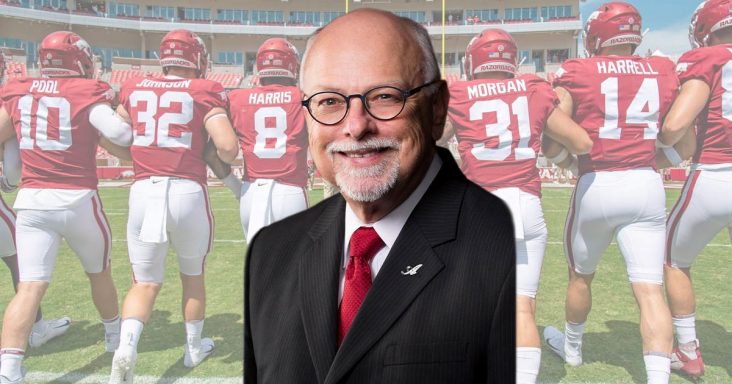UA Chancellor Steinmetz discusses timeline for decisions about football games
by July 9, 2020 2:06 pm 1,722 views

Will there be college football this fall?
It’s a question fans are asking and decision-makers are discussing at several levels daily throughout the country.
Some smaller dominoes are already falling. The Ivy League, Bloomberg reported, canceled sports competition for the upcoming semester because of health and safety concerns about the COVID-19 pandemic, becoming the first NCAA Division I conference in the U.S. to scrap football.
That announcement follows similar football cancellations by smaller schools, a contrast to the large universities that haven’t announced plans and regularly draw tens of thousands of fans.
In a Thursday morning (July 9) interview via Zoom with the Northwest Arkansas Business Journal, University of Arkansas Chancellor Joe Steinmetz and Steuart Walton, chairman of Gov. Asa Hutchinson’s Arkansas Economic Recovery Task Force, shared their thoughts on the subject.
“If we were in the current condition in September, I don’t think it’d be likely we’d be having crowds at a football game [in Fayetteville],” Steinmetz said. “And not just talking about Fayetteville and Arkansas. We’ve got the University of Florida in our conference. Texas A&M is in our conference. You can see what is going on [in those states].”
With the September start of the season getting closer by the day, Steinmetz said he discusses options related to football with UA athletic director Hunter Yurachek “almost daily.” He is also part of a weekly teleconference with Southeastern Conference Commissioner Greg Sankey and other university chancellors and presidents.
Yurachek and a handful of higher education representatives also serve with Walton on the Arkansas Economic Recovery Task Force. Walton said the education discussions have been especially thoughtful in terms of ways to deal with the crisis and its impact on returning to school in August.
“It’s as complicated as it seems, which is really complicated,” Walton said. “The folks in education on the task force have maybe been ahead of the rest of us. I’ve been impressed with their approach and their thinking and their decisions. Considering there’s a wider array of possibilities in terms of potential outcomes of where we might be in the fall. Hunter Yurachek has been a great participant in those discussions.”
Steinmetz said several football options are under discussion, ranging to playing games without fans, playing games with drastically reduced crowds, or scenarios where the season is delayed or shortened.
“I think what’s going to happen is, as we move into August and assess where we are with the virus itself, these options will be put on the table, and we’ll see where we go,” he said.
Steinmetz, the UA Chancellor since Jan. 1, 2016, previously worked as executive vice president and provost Ohio State University and held academic and administrative positions at Stanford, Indiana and Kansas before that.
He recognizes the economic importance of playing football at the upper levels of Division I, where most programs subsidize a large portion of expenses of other teams within the athletic department. A disruption to the season could disrupt important revenue streams — and lead to more dominoes falling.
The UA football program ended the 2018-2019 fiscal year — the most recent data available — with a profit of $33.3 million, up 43% from the previous year. The program had total operational revenue of a record $76.46 million to go along with expenses of $43.16 million.
The entire UA athletic department had a $6.3 million profit in the 2018-2019 fiscal year on total revenue of $139.5 million. That was up sharply from the previous year’s profit of $1.95 million.
The UA had 484 student-athletes competing in 20 sports in 2018-2019 — eight men’s sports and 12 women’s sports. Arkansas’ athletic department is financially self-sufficient, meaning it does not use institutional money or student fees.
Only three of those sports (football, men’s basketball and baseball) made a profit. The other sports operate in the red — some losing millions each year—and depend heavily on football revenues to sustain them.
For example, during the 2018-19 fiscal year, the women’s track and field and cross country teams at the UA reported revenue of $501,223 and expenses of $4.4 million. The men’s track and field and cross country teams reported income of $461,833 and costs of $4.1 million. Women’s soccer reported revenue of $116,991 and expenses of $2.31 million.
“As you might imagine, the impact the sport of football has on the rest of the athletic program is unbelievable,” Steinmetz said. “It funds a lot of the operations, so it’s extremely important.”
Finances notwithstanding, Steinmetz said it’s essential to have an environment that is “completely safe” not just for the fans but also for the players.
“Just like I could not predict where we are now with the [COVID-19] virus a month ago, I cannot predict where we will be a month from now,” he said. “I think it’s all dependent, as we know, on peoples’ behavior. That makes it tough.”
Arkansas is scheduled to begin its football season Sept. 5 in Fayetteville against the University of Nevada. The start time has not been announced. The Razorbacks next two games are at Notre Dame (Sept. 12) and at Mississippi State (Sept. 19).
